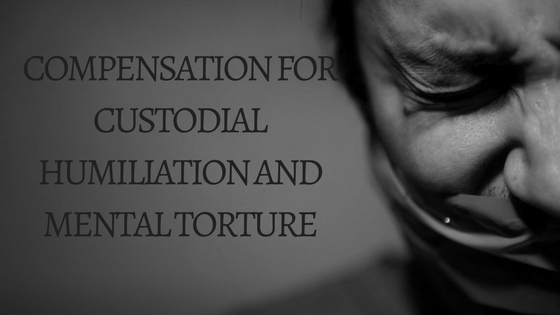Aapka Consultant Judgment Series- In this series, we are providing case analysis of Landmark Judgments of Hon’ble Supreme Court of India.
Mehmood Nayyar Azam v. State of Chhattisgarh
AIR 2012 SC 2573, [2012] 8 SCC 1
JUDGES: K.S. Radhakrishnan and Dipak Misra
Date of Decision: 03-08-2012
FACTS:-
In the instant case, the appellant, a doctor and a social activist, being falsely implicated in multiple criminal cases for helping weaker sections of society against local coal mafia and others. In police custody, appellant was photographed with a placard, wherein self-humiliating words were written, circulated amongst general public and was used in revenue proceedings. The High Court has recorded finding that appellant was harassed and thus, was entitled to compensation. It directed State Government to determine compensation and award the same, but on failing to do so; the Supreme Court gave another chance to the State Government to award compensation. Unfortunately the State Government denied compensation on ground that it was a case of defamation which could only be determined by a competent court. Thus appellant denied compensation for 19 yrs. Thus, after being suffered for years, appellant approached before the Hon’ble Court against the order of the High Court to award compensate.
ISSUES:-
- Whether compensation could be awarded for the custodial humiliation and mental torture under Article 21 of the Constitution?
- Whether the appellant should be asked to initiate a civil action for grant of damages on the foundation that he has been defamed?
JUDGMENT:-
The Hon’ble Court was really concerned that how in a country governed by rule of law and where Article 21 of the Constitution is treated to be sacred, the dignity and social reputation of a citizen has been affected. The Counsel appearing for the appellant submitted that when the conclusion has been arrived at that the appellant was harassed at the hands of the police officers and in the departmental enquiry they have been found guilty and punished, just compensation should have been awarded by the High Court. The State has supported the order of the High Court as well as the order passed by the competent authority of the State who has rejected the representation on the foundation that when the appellant puts forth a claim for compensation on the ground of defamation, he has to take recourse to the civil court and, therefore, no fault can be found with the decision taken either by the High Court or the subsequent rejection of the representation by the authority of the State. Further, legal counsel appearing for the respondents had submitted that they have already been punished in a disciplinary proceeding and, therefore, the question of grant of compensation does not arise and even if it emerges, the same has to be determined by the civil court on the base of evidence adduced to establish defamation.
Hon’ble Court has, at the very outset, Hon’ble Court convinced and admitted without any reasonable doubt the aspects, that the appellant was arrested and the High Court and was harassed in the police custody. But here the Court is more concerned with the rights guaranteed under Article 21 rather than with defamation.
The Hon’ble Court in D.K. Basu v. State of W.B [AIR 1997 SC 610 : (1997) 1 SCC 416] diverted to Article 21 and stated that expression “life or personal liberty” will include the right to live with human dignity and thus, it would also include within itself a guarantee against torture and assault by the State or its functionaries. The Hon’ble Court further stated that if the functionaries of the Government become law-breakers, it was bound to breed contempt for law and would encourage lawlessness and every man would have the tendency to become law unto him thereby leading to anarchy. No civilized nation can permit that to happen, for a citizen does not shed off his fundamental right to life, the moment a policeman arrests him. The right to life of a citizen cannot put in abeyance on his arrest. It was ruled that right to reputation is a facet of right to life of a citizen under Article 21 of the Constitution.
The Hon’ble Court expressed relief monetary compensation as exemplary damages, in proceedings for established infringement of the indefeasible right guaranteed under Article 21 is a remedy available in public law and is based on the strict liability for contravention of the guaranteed basic and indefeasible rights of the citizen.
Taking note of the totality of facts and circumstances, it was clear that the appellant suffered mental torture at the hands of insensible police officials that withers away the very essence of life as enshrined under Article 21 of the Constitution. The High Court has recorded the findings in the favour of the appellant but left him to submit a representation to the concerned authorities who in return, rejected the representation and considered the same as a matter of defamation. The Hon’ble Court granted a sum of Rupees Five Lacs towards compensation to the appellant. Consequently, allowed the appeal.
HELD:-
Hence, it was held, that a quantum of compensation for custodial humiliation and torture, whether physical or mental, affecting rights under Article 21 should be awarded.
To Get Legal Opinion from Advocates/ Legal Experts, Please click here
To Get Legal Opinion from Retired Hon’ble Judges, Please click here












